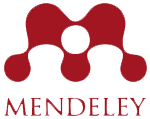PENGELOLAAN SEKOLAH MENENGAH KEJURUAN DI ERA 4.0 MELALUI KEPEMIMPINAN KEPALA SEKOLAH YANG EFEKTIF
Riana Isti Muslikhah, Universitas Negeri Yogyakarta, Indonesia
Arwan Nur Ramadhan, Universitas Negeri Yogyakarta, Indonesia
Muhyadi Muhyadi Muhyadi, Universitas Negeri Yogyakarta, Indonesia
Abstract
Abstrak: Pengelolaan Sekolah Menengah Kejuruan Di Era 4.0 Melalui Kepemimpinan Kepala Sekolah Yang Efektif. Kepemimpinan kepala sekolah akan berdampak kepada kinerja guru serta dalam menciptakan lingkungan sekolah yang kondusif. Oleh sebab itu, kepemimpinan yang digunakan haruslah tepat. Tujuan penelitian ini untuk mengetahui kepemimpinan kepala sekolah dalam pengelolaan SMK. Melalui penelitian ini diharapkan dapat diketahui bagaimana kepemimpinan yang tepat dalam pengelolaan SMK di era revolusi industri 4.0 sehingga dapat meningkatkan daya saing lulusan SMK. Metode yang digunakan dalam penelitian ini adalah survei dengan pendekatan kuantitatif. Teknik pengumpulan data menggunakan kuesioner yang dikemas dalam format google form. Kesimpulan dari penelitian ini menunjukkan bahwa praktik kepemimpinan kepala sekolah SMK di DIY pada era revolusi industri 4.0 secara keseluruhan tergolong efektif. Pola kepemimpinan yang diterapkan, yang mencakup aspek-aspek: cara pengambilan keputusan, keterlibatan bawahan dalam pengambilan keputusan, implementasi dan tindak lanjut pengambilan keputusan, proses komunikasi, penguasaan teknologi, dan dukungan sarana prasarana, semuanya tergolong efektif.
Kata kunci: Kepala Sekolah; Kepemimpinan; Revolusi Industri; SMK;
Abstract: Management of Vocational High Schools in the Era 4.0 Through Effective Principal Leadership. The principal's leadership will have an impact on teacher performance and in creating a conducive school environment. Therefore, the leadership used must be appropriate. The purpose of this study was to determine the principal's leadership in the management of vocational high school. Through this research, it is hoped that it will be known how the right leadership in the management of vocational high school in the era of the industrial revolution 4.0 can improve the competitiveness of VHS graduates. The method used in this research is a survey with a quantitative approach. The data collection technique used a questionnaire packaged in a google form format. The conclusion of this study shows that the leadership practices of vocational school principals in DIY in the industrial revolution 4.0 era were overall quite effective. The leadership pattern applied, which includes the following aspects: decision-making methods, involvement of subordinates in decision-making, implementation and follow-up of decision-making, communication processes, mastery of technology, and infrastructure support are all considered effective.
Keyword: Headmaster; Industrial Revolution; Leadership; Vocational High School;
Keywords
Full Text:
PDFReferences
A mar, F., & Eleyan, D. (2022). Effect of principal s technology leadership on teacher s technology integration. International Journal of Instruction, 15(1). https://doi.org/10.29333/iji.2022.15145a
Baedhowi, dkk. 2017. Tata Kelola Sekolah Menengah Kejuruan dalam Meningkatkan Kualitas dan Daya Saing Sumber Daya Manusia Indonesia. Jakarta: Direktorat Pembinaan Sekolah Menengah Kejuruan. 2019.Optimalisasi Tata Kelola Ekosistem SMK. Jakarta: Direktorat Pembinaan Sekolah Menengah Kejuruan.
Bolatan, G. I. S., Golgeci, I., Arslan, A., Tatoglu, E., Zaim, S., & Gozlu, S. (2022). Unlocking the relationships between strategic planning, leadership and technology transfer competence: the mediating role of strategic quality management. Journal of Knowledge Management, 26(11). https://doi.org/10.1108/JKM-12-2020-0897
Bush, T., & Marianne, C. (2000). Leadersip and Strategic Management in Education. London: Pahaul Chapmant Publishing.
Dwijonagoro, S., Ghufron, A., Khurniawan, A. W., Ismara, K. I., Setiadi, B. R., Damarwan, E. S., Rezani, R., Wibowo, A. E., Ratnawati, D., & Panditatwa, P. (2019). Turbulensi pendidikan vokasi di era disrupsi 4.0 (B. R. Setiadi, A. E. Wibowo, & M. A. Majid (eds.)). Direktorat Pembinaan Sekolah Menengah Kejuruan (DitPSMK). https://psmk.kemdikbud.go.id/konten/4585/turbulensi-pendidikan-vokasi-dieradisrupsi-40.
Fitriyah, I., & Santosa, A. B. (2020). Kepemimpinan Kepala Sekolah Dalam Menghadapi Era Revolusi Industri 4.0 untuk Meningkatkan Mutu Sekolah. JMKSP (Jurnal Manajemen, Kepemimpinan, Dan Supervisi Pendidikan), 5(1). https://doi.org/10.31851/jmksp.v5i1.3538
Hazzam, J., & Wilkins, S. (2023). The influences of lecturer charismatic leadership and technology use on student online engagement, learning performance, and satisfaction. Computers and Education, 200. https://doi.org/10.1016/j.compedu.2023.104809
Herman. (2021). Kepemimpinan Pendidikan Transformasional di Era Revolusi Industri 4.0. Jurnal Dedikasi Pendidikan, Vol. 5, No. 2, 361-373
Kagermann, H., Helbig, J., Hellinger, A., Wahlster, W. (2013). Recommendations for implementing the strategic initiative Industrie 4.0: Securing the future of German manufacturing industry; final report of the Industrie 4.0 Working Group
Karakose, T., Demirkol, M., Yirci, R., Polat, H., Ozdemir, T. Y., & Tülübaş, T. (2023). A Conversation with ChatGPT about Digital Leadership and Technology Integration: Comparative Analysis Based on Human–AI Collaboration. Administrative Sciences, 13(7). https://doi.org/10.3390/admsci13070157
Mukhlasin, A. (2019). Kepemimpinan Pendidikan di Era Revolusi Industri 4.0. Jurnal Tawadhu, 3(1).
Omar, M. N., & Ismail, S. N. (2020). Mobile Technology Integration in the 2020s: The impact of technology leadership in the Malaysian context. Universal Journal of Educational Research, 8(5). https://doi.org/10.13189/ujer.2020.080524
Raman, A., & Thannimalai, R. (2019). Importance of Technology Leadership for Technology Integration: Gender and Professional Development Perspective. SAGE Open, 9(4). https://doi.org/10.1177/2158244019893707
Risdianto, E. (2019). Analisis Pendidikan Indonesia di Era Revolusi Industri 4 . 0 Analisis Pendidikan Indonesia Di Era Revolusi Industri 4.0, April, 0–16.
Sarjito, A. (2019). Model Kepemimpinan Digital Di Era Revolusi Industri 4.0. Diakses dari https://www.researchgate.net/publication/338108321_Model_Kepemimpinan_DiGital_Di_Era_Revolusi_Industri_40/link/5dff1fa0299bf10bc36ed09e/download tanggal 9 September 2020.
Schmitz, M. L., Antonietti, C., Consoli, T., Cattaneo, A., Gonon, P., & Petko, D. (2023). Transformational leadership for technology integration in schools: Empowering teachers to use technology in a more demanding way. Computers and Education, 204. https://doi.org/10.1016/j.compedu.2023.104880
Schwab, K. (2016). The Fourth Industrial Revolution. Switzerland: World Economic Forum.
Siswantoyo, dkk. (2019). Daya Saing SMK dalam Bursa Tenaga Kerja 4.0. Jakarta: Direktorat Pembinaan Sekolah Menengah Kejuruan.
Sulistyorini.(2008). Hubungan Antara Manajerial Kepala Sekolah dan Iklim Organisasi Dengan Kinerja Guru. Jurnal Ilmu Pendidikan.
Winanda, J. E., & Nurani, F. (2019). Kepemimpinan transformasional dalam dunia pendidikan di era revolusi industri 4.0. Blog.Ub.Ac.Id.
DOI: https://doi.org/10.21831/efisiensi.v21i2.77447
Refbacks
- There are currently no refbacks.

This work is licensed under a Creative Commons Attribution-NonCommercial-ShareAlike 4.0 International License.


















This work is licensed under a Creative Commons Attribution-ShareAlike 4.0 International License. read more...















































